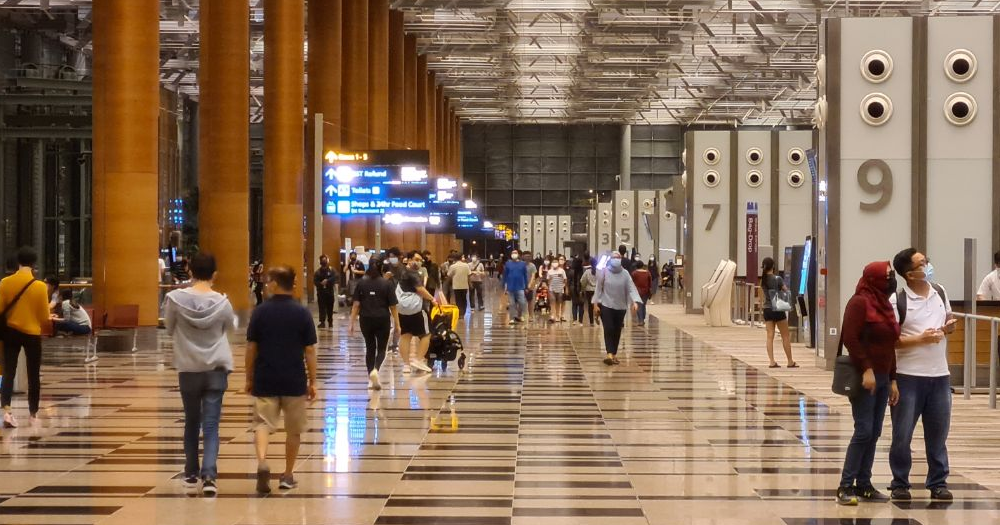Follow us on Telegram for the latest updates: https://t.me/mothershipsg
Since May 7, travellers arriving from higher-risk countries and regions — that is, all countries and regions other than Australia, Brunei Darussalam, Hong Kong, Macao, Mainland China, and New Zealand — have been required to serve 21-day Stay-Home Notices (SHNs) at dedicated SHN facilities.
From 11:59pm on Jun. 23, all new travellers arriving to Singapore from higher-risk countries and regions will be subject to a 14-day SHN, down from the previous requirement of 21 days.
No evidence that variants have longer incubation periods
In a press release on Wednesday (Jun. 23), the Ministry of Health (MOH) said that the increased SHN period to 21 days had been adapted as a precaution, given that little was known about the emerging Covid-19 variants, including how long their incubation periods were.
MOH said that they have since reviewed international evidence and local case data, and have found no evidence that the variants come with longer incubation periods, although they do have increased transmissibility.
Between May 8 and Jun. 22, there have been 270 imported cases among travellers with recent travel history to higher-risk countries and regions.
All of them had incubation periods "well within" the 14-day window, said MOH.
"As such, we will reduce the SHN period from 21 days back to 14 days."
Affected travellers who are currently serving SHN will have their SHN reviewed, and will be informed of check-out arrangements separately. Refund details are also being worked out for these affected travellers and will be shared with them separately.
Self-testing on day 3, 7, and 11 of SHN
However, because of the higher transmissibility of the new variants, and in order to identify potential cases early, travellers will be required to test themselves regularly with antigen rapid test (ART) self-test kits during their SHN.
They will need to test themselves on the third, seventh, and eleventh days of their arrival to Singapore.
This new requirement will be implemented for new arrivals from 11:59pm on Jun. 27.
This is in addition to the polymerase chain reaction (PCR) tests that they have to take upon arrival in Singapore and on day 14 of their arrival, before exiting their SHN.
They will be allowed to end their SHN as long as they have a negative result for their PCR test on Day 14 of their arrival.
Travellers from Taiwan & Israel can serve SHN at residence
Previously, travellers who had stayed in Taiwan and Israel in the 21 days immediately prior to arriving in Singapore were required to serve a 14-day SHN at dedicated SHN facilities, and an additional 7-day SHN at their place of residence.
Starting from 11:59pm on Jun. 23, travellers who had stayed in Taiwan and Israel in the 21 days immediately prior to arriving in Singapore will be allowed to apply to opt-out of dedicated SHN facility before their arrival in Singapore, and instead serve their 14-day SHN at their place of residence.
To be eligible to do so, they must not have travelled to any other country or region other than Taiwan or Israel in the consecutive 21 days immediately prior to entry to Singapore.
They also must be occupying their place of residence alone or only with household members who are also serving SHN, with the same travel history and length of SHN.
SHN for migrant workers & sea crew
MOH said that newly-arrived migrant workers from higher-risk countries or regions and who are staying in dormitories or working in the Construction, Marine and Process (CMP) sector will continue to go through an additional 7-day stay at the Migrant Worker Onboarding Centre (MWOC) or a dedicated facility after they are cleared from their 14-day SHN at dedicated SHN facilities.
This additional 7-day stay has been in place since January 2021, and will include an additional testing regime, medical examination, and Settling-In-Programme (SIP) where required, the ministry said.
It is meant to "further minimise any small risk of imported Covid-19 positive cases transmitting the virus into the dormitories or at the worksites which can result in large clusters". It will be regularly reviewed as the Covid-19 situation evolves, said MOH.
New crew from higher risk countries or regions who are entering Singapore on a long-term permit to work onboard harbour craft operating in the Port of Singapore will also need to undergo an additional 7-day stay and testing regime at a dedicated facility after their 14-day SHN, before they are able to begin work onboard the harbour craft.
"This will serve as a precaution in view of the essential marine services that the harbour craft provide to support our supply chain."
Top photo by Joshua Lee.
If you like what you read, follow us on Facebook, Instagram, Twitter and Telegram to get the latest updates.
